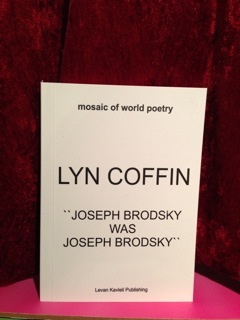Joseph Brodsky Was Joseph Brodsky
Lyn Coffin
Levan Kaveli Publishing, Tbilisi, Georgia
77 pages, $2

Review by Judith Roche
Words Fail Her /Beautifully
So when is the last time you saw a new book for $2.00? This little book, pocket-sized at 5 1/2 by 4 inches, is a slyly smart little cookie, a compact piece of poems and prose, a big bang for the buck. It's published in Georgia, the country not the state, by a new press wanting to provide poetry to Georgians, the English-speaking world and the with ambitions for rest as well. The series is called "mosaic of world poetry."
Coffin was Brodsky's teaching assistant in Ann Arbor during the early 1970s and worked closely with him. Her essay remembering Brodsky is the linchpin of this book, but it includes some quite fresh and very alive poems as well. She begins the essay by stating this is not a scholarly assessment of his writing but rather a personal remembrance of the man and the poet, "I would not presume to say I ever understood Joseph. He was a great poet and a Russian, two classes of people that have always struck me as far more inscrutable than the Asian people singled out in the cliché. " However the stories she chooses to tell are full of her characteristic humor and irony. The great Russian poet comes through as both larger than life and most human as well. Among other things he puts Coffin on the spot in class: " 'Lyn," Joseph said, speaking wearily, as if from a great depth. 'Tell them something about Auden.' So I told them something about Auden (probably trembling in my boots lest I make an error...). "
But most of the book is Coffin's poems, which come through as both formal and free, both funny and grief-stricken, but full of a kind of sophisticated irony as well as an earnest sincerity. There are sonnets, rhymed quatrains, and a paradelle (on love), which is a parody of a villanelle. Love is a subject ripe for parody in contemporary poetry (oh, how to be serious without being sappy about it?). Coffin manages with both wit and un-sappy longing for love. In "How God Speaks to Us" (...in schoolmasterly claps,/ erasers of thunder, parabolas of/memory...) it turns out to be a movie in which nobody really gets hurt but "an ending we can all embrace as/far in the future, and wildly happy." But people do get hurt and in "Oh," a prose poem about 9/11, "Oh say can you see All the angels are people People are falling Buildings are burning..." The form of prose poem with no punctuation does evoke the stunned reality of that horrible day.
She has several poems that could be considered an ars poetica, including a tongue-in-cheek history, "American Poetry, a geneology," which had me trying to figure out just to whom she was referring (okay, that one has to be Whitman and that one Pound, but who's that one?- kind of the "Bye, bye, Miss American Pie" game for poetry instead of rock and roll.).
In "A Mountain Range on Its Side" She's going to Spain, presumably to meet a lover, after musing on what might be on her tombstone
...Life is a short shot of express espresso expression- later and sooner we lay waste our powers- latte and scone we make love with our powers- and I'm going to Spain! star spangled in the non chauvinistic espangled Spanish fly fly away sense oh Valencia- we love you va va va Valencia what do you see when you see Valencia you see a sea and soon you'll see me by the seaside sipping salty air la de da lady her life's a glass slipper
Coffin's sheer joy language here is wonderful to behold. The poem ends with what might be another ars poetica. Poetry has been described/ defined as "the art of saying what cannot be said." and Coffin does it.
words fail me beautifully
